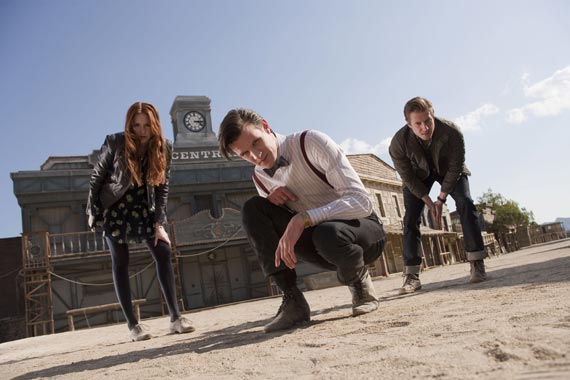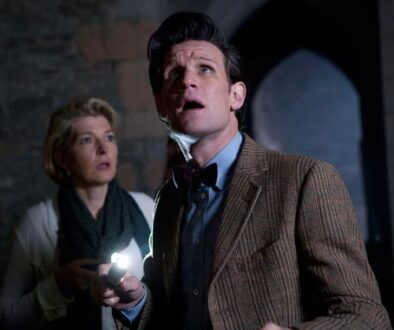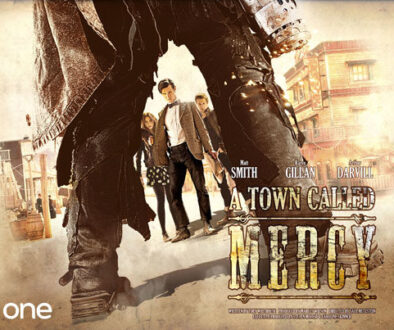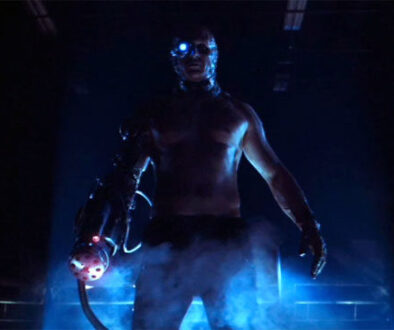2nd Opinion: A Town Called Mercy

John Hussey and Adam James Cuthbert each give their own take on the 3rd episode of Series 7.
John’s verdict
And now we hit the grand-daddy of them all! Toby Whithouse you’ve done it again! A Western-showdown between the Doctor and a Cyborg-Cowboy. How much bigger and better can you get in a massive blockbuster-style series of Doctor Who?
When I first heard that Steven Moffat and Caroline Skinner were doing another Western Story, having it written by the brilliant Toby Whithouse, I was thrilled and excited beyond all belief. Then came the news about them actually going over to Spain to film it where many of the Western legends were done, I was blown out of my mind due to the sheer scale and budget Doctor Who was showcasing. And after that long wait, I can honestly say I wasn’t disappointed. They certainly did the right thing by filming it in Spain as it gave the story more depth and scenery, which is what a western showdown of this kind of scale needed. It made it so much bigger. Nowhere in Wales could have substituted this kind of location.
The one thing that caught my eye from the very beginning though was the impressive Gunslinger. So far, ‘A Town Called Mercy’ is the second Doctor Who story to be set in the Wild West, with the Doctor’s first outing being back in William Hartnell’s third Season in the episode ‘The Gunfighters’. In that story the Doctor donned the Marshal’s badge to help fend off the sinister Johnny Ringo and the Clanton Brothers alongside Doc Holliday and Wyatt Earp. This time round however, Whithouse has the Doctor pitted against a cyborg-Cowboy. I must admit I love its design. It looks so cool. The whole rough, dirty and gritty look makes the Gunslinger look fierce and bred for war; which, it turns out, it was. Also the deep electronic voice adds to its power and helps represent its physical factors as a cyborg. Though what makes its character even more unique is its back-story; one that makes you give sympathy to the creature rather than condemning it as a monster.
This is where we also come to the other unique character of the story; Kahler-Jex. Jex is first thought to be an innocent alien doctor who crashed landed in the Wild West and is now living among the residents of Mercy Town. But after the Doctor pays a little trip to his spaceship, he soon learns the awful truth; he is in fact a war criminal. A war criminal that was responsible for the monstrous appearance and killer functions of the Gunslinger. A mad scientist who committed unearthly experiments on his own people, who had apparently volunteered for special training but ultimately, became lab-rats to help build the perfect cyborg warrior. The whole plot of vengeance and redemption between the Gunslinger and Kahler-Jex is what makes the story so strong, and with the back-drop of the unique Wild West setting, Toby has definitely created ‘The God Complex’ of Series 7.

What is also interesting about Kahler-Jex is his dreadful and dark history of war which almost, in many way, echoes back on to the Doctor and showcases his dark and sinister life. The conversation in the jail house demonstrates this greatly. Everything Jex says bounces back at the Doctor. The whole description of Kahler’s people when they die and how they carry the souls of all those they have wronged really does make you think how much the Doctor would carry on his back on his journey to the next world, once he finally meets his maker. All the things he’s done, especially during the Time War to his own people, the Time Lords, and his deadly enemy the Daleks, it all reflects back to what Jex has done during his war. They are most alike and I suspect deep down the Doctor knows this.
Now onto the Doctor’s dark side. Continuing on from last week where we saw the Doctor take the law into his own hands and condemn Solomon to death, we now see the Doctor almost do the same again. Those scenes were truly tense for me, in a good way. I was filled with excitement and terror. The Doctor was really going dark and I thought for a moment he was going to shoot Kahler-Jex. The whole part where he pushed the Doctor beyond his limit when he was comparing him to himself was just full of tension and upon the Doctor exploding with rage and dragging the alien doctor out of the jail, I was shocked. Even Rory slightly surprised me when he was backing up the Doctor wanting to throw him out of Mercy and allow the Gunslinger to take him. But unlike last time though, the Doctor didn’t have Amy there to tell him he was wrong and out of order. That scene really did show the chemistry between them but, at the same time, it showed how far the Doctor has come without her by his side. His inner demons really have shown over these last two stories and I hope this side of the Doctor will continue to be explored.
I must say though, the ending was quite surprising to me. Kahler-Jex’s sacrifice by blowing himself up, thereby stopping the hunt and preventing any more innocent people like Sheriff Isaac dying, really did show how complicated his character was to both the understanding of the Doctor and us the audience. It certainly did become an episode of guessing who the true villain was: the Gunslinger, Kahler-Jex or even at some points the Doctor. I thought it was nice that the Gunslinger got a second chance at life by becoming the protector of Mercy Town. It really did end the story on a high; showcasing that the Gunslinger wasn’t really bad, merely wronged and he wished justice for the awful acts committed to him in the past.
Once again Toby Whithouse delivers a masterpiece filled with fantastic characters and a brilliant story full of morals and excellent plot twists. The Doctor Who team certainly used the locations of Spain to the best of their abilities and created a Western showdown like no other. Now, onward towards the return of UNIT and the introduction of Kate Stewart, who I hope turns out to be the late Brigadier’s daughter, during the mystical invasion of the Cubes.
Adam’s verdict

One of the motifs of Toby Whithouse’s stories, thus far, is the exploration of the Doctor’s darker side and the ramifications it has on his relationship with his companions. With A Town Called Mercy, Toby Whithouse skilfully uses the setting of the Western genre, itself traditionally associated with morality parables and commentary on the dualities of nature, to present a fascinating insight into the Doctor’s character.
The Doctor encounters the alien scientist Kahler-Jex, who has assumed the position of doctor to the townsfolk of Mercy, as well as providing the town with rudimentary heat and lighting. Jex is being threatened by the cyborg Gunslinger. The Doctor subsequently discovers that Jex built the cyborg as part of an experimental weaponry program that fused volunteers, against their will, with machinery, in order to bring peace to the world of the Kahler. Jex is presented as an ambivalent character, who is gradually revealed to be a tragic and flawed individual who only did what he believed to be right. On one hand, he’s a criminal and murderer, sacrificing innocent lives in the name of war: he is sinister and deceitful. On the other hand, like all his people, he believes that when he dies he will have to bear the horrible weight of those souls he wronged in life; repentant for his actions by assisting the people of Mercy. Jex notes the similarities between himself and the Doctor, infuriating the Doctor by accusing the Doctor of cowardice. The Doctor forces Jex out of town, and is prepared to kill him, pointing a gun at his head. It’s worth speculating that if Amy hadn’t stopped the Doctor, he might very well have done so. Indeed, the Doctor’s behaviour within this scene is strikingly reminiscent of the Time Lord Victorious. In both cases, the Doctor’s loneliness witnessed a transformation of his character into a haughty, self-righteous persona willing to contradict his moral principles if it meant innocent lives would be spared from the onslaught of evil and injustice. Amy challenges the Doctor. The Doctor retorts that he will no longer compromise, not if evil will always find a way to survive. Amy serves as the manifestation of the Doctor’s conscience here: representative of the moral codes by which he has lived. She convinces the Doctor to seek an alternative solution. The sequence itself is intense, with superb acting from Adrian Scarborough and Matt Smith; indeed, Scarborough nearly steals the show from Matt Smith, the dynamic between the actors by far the highlight of the episode for me.

The Gunslinger itself is an impressive creation: a sort of Frankenstein’s Monster reinterpreted through a distinctly Who twist. The Gunslinger is ultimately a tragic figure: a man who perceives himself as a grotesque brute, disconnected from his past by the horrors of his transformation, unable to return home out of shame of his appearance. He has killed out of revenge. In many ways, he is also a reflection of the Doctor himself. One could easily compare the Gunslinger here with the Ninth Doctor’s characterisation in Dalek: both are men that have been ‘mechanised’ by war, justifying an act of murder in their efforts to eradicate perceived evils. It’s interesting to note that America, especially the Old West, has been described as the ‘New World’ – a land of pioneer spirit and new opportunities. I find it symbolic that the Gunslinger (who has experienced a war like the American nation itself) by coming to this ‘New World’ should be given the opportunity to rediscover his meaning in life, thus reacquiring his former ‘humanity’ in that respect.
In conclusion, A Town Called Mercy proved to be a winning combination from Toby Whithouse, continuing his theme of exploring the Doctor’s darker side while experimenting successfully with the choice of location and setting.
You can read more of Adam’s thoughts at Cult Fix.








